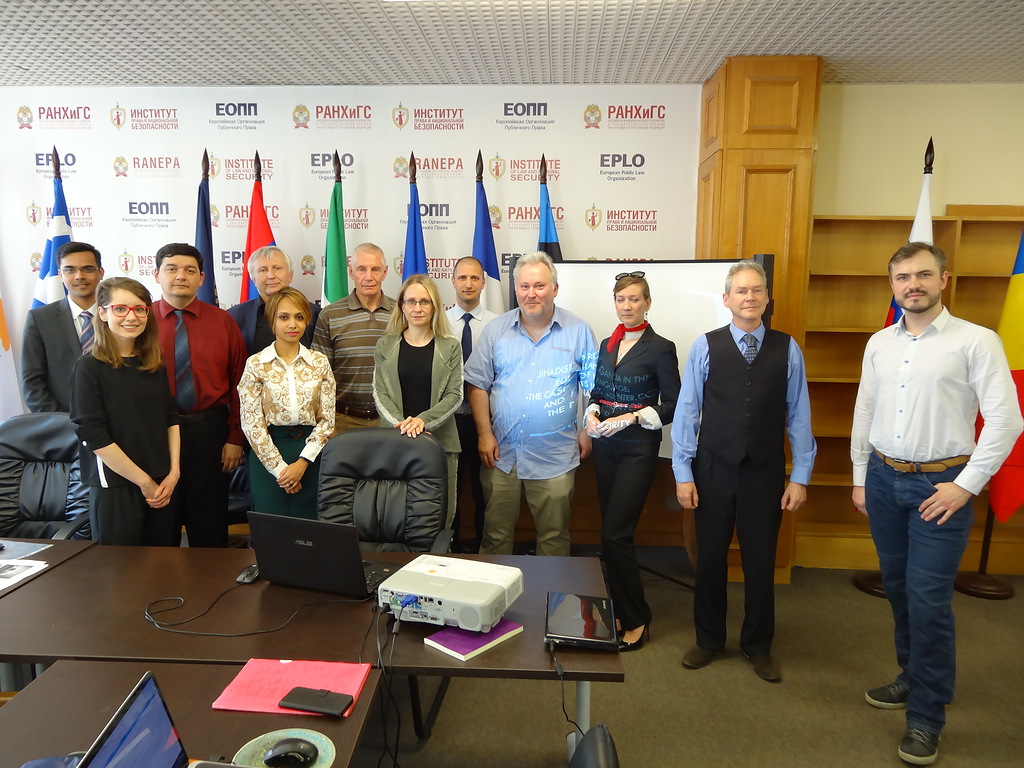
Experts from Six Countries Discussed the Strategic Communication Issues in Russian Presidential Academy
On 25th of April 2019, the round table “Strategic Communication Facing the Contemporary Political Challenges” took place in the Institute of Law and National Security of the Russian Presidential Academy of National Economy and Public Administration (RANEPA). The Chair of the International Security and Foreign Policy of Russia organized the event with an academic and information support of the European-Russian Communication Management Network (EURUCM Network), and Association of Studies, Research and Internationalisation in Eurasia and Africa – ASRIE (Italy), Eurocontinent (Belgium) and The Geopolitics of the East Association (Romania).
Head of the Chair, Doctor of Sciences (in Politics), Professor Alexander MIKHAILENKO addressed the guests of the round table with a welcoming speech. He told about the long history of the Presidential Academy, established based on two Soviet Academies. One was founded in 1946 as an Academy of the Social Sciences under the Central Committee of the Communist Party of the Soviet Union, and the second one, founded in 1977, was the Academy of the National Economy under the Council of Ministers of the USSR. Since 2010, when both the academies were merged in RANEPA, the biggest educational establishment in Russia, its activity combines many education and research directions, in its Moscow campus and 54 regional branches. Professor Mikhailenko also stressed the importance of the international contacts for the Chair and the significance of the round table topic given the contemporary political situation.
Round table contributors

The event was moderated by Doctor of Sciences (in Politics), Professor at the Chair of the International Security and Foreign Policy of Russia (and also the Senior Researcher at the School of International Relations at the Saint Petersburg State University) Darya BAZARKINA and Doctor of Sciences (in General History), Professor, Leading Researcher at the Diplomatic Academy of the Ministry of Foreign Affairs of the Russian Federation, Senior Researcher at the School of International Relations at the Saint Petersburg State University, Director of the International Centre for Social and Political Studies and Consulting Evgeny PASHENTSEV. Ten papers on different aspects of the states’ and integration entities’ StratCom were presented by the specialists from Belgium, India, Italy, Sweden, Romania and Russia.
Darya BAZARKINA presented the paper “Counteraction to Terrorist Propaganda as a Task of Strategic Communication: the European Union Experience”. She introduced her point of view on the communication provision of the counter-terrorist activity, which can be defined as “the elaboration and implementation of measures that ensure an organisation’s activities by means of communication, including managerial decisions, information distribution mechanisms and information transmission to internal and external target audiences with the aim of influencing them”. She stressed that the terrorist narratives in the context of the development of modern ICT have spread through a number of everyday communication channels, but the systematic impact of terrorist propaganda is, in her opinion, a key factor in its success. It increases when potential fighters, one of the propaganda’s target audiences, obey the instructions of propagandists to isolate themselves from the outside world. Darya Bazarkina also considered the cases of the communication provision of countering terrorism in the European Union, and assumed that it goes far beyond the activities of Arab StratCom Task Force, founded in 2015 to combat IS propaganda. Wide range of European structures, including those whose tasks go far beyond counter-terrorism, are involved in it. Thus, disruption implemented by Europol represents a key method in countering IS online propaganda. The Radicalisation Awareness Network (RAN) implements the method of campaign and message design.
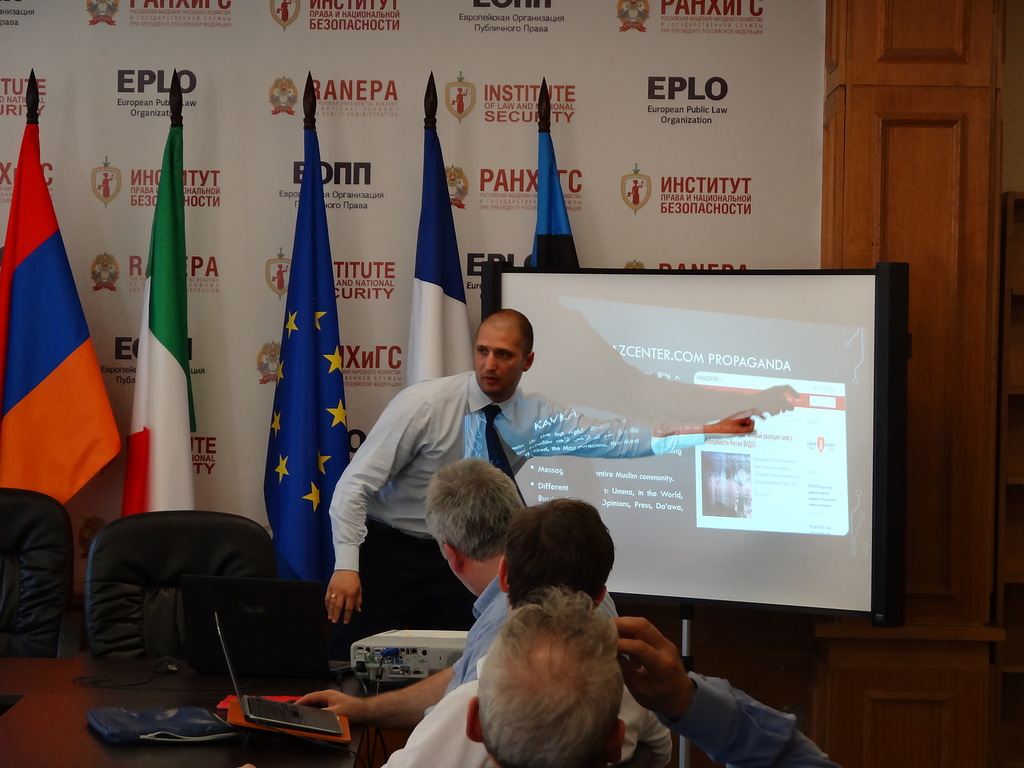
Giuliano Bifolchi
Giuliano BIFOLCHI, PhD Candidate at the University of Rome Tor Vergata and Co-founder of the Association of Studies, Research and Internationalisation in Eurasia and Africa (ASRIE, Italy), in his paper “Jihadist Propaganda in the Russian Language: the Case of Kavkazcenter.com and Its Implication for the National Security” noticed that after the rise of the Islamic State, the international and academic community started paying attention on jihadist propaganda in Russian language. He searched in his presentation the case study of Kavkazcenter and paid attention on the misunderstanding between Russia and the EU in their approaches to countering jihadist propaganda. Thus, “the European Union has several times declared its commitment in the fight against all form of terrorism and crime and the will to improve the cooperation with the Russian Federation in the field of security: unfortunatley, the EU’s behaviour on the North Caucasus, its partnership with Georgia, and its support of some members of the former Chechen Republic of Ichkeria have been perceived by the Kremlin as a threat to its national security.” Giuliano Bifolchi concluded, that Kavkazcenter.com is a website well-structured for the Russian speaking audience. The website is long-live because it is (or it was) supported by Western countries and organisations. Foreign governments and organisations should understand that supporting Kavkazcenter.com might become a threat for the international security because the message can reach the Muslim communities in Central Asia and the Caucasus but also the Russian and Caucasian migrants in Europe. Mr Bifolchi’s paper is significant for the analysis of the common EU-Russia security issues and the possibilities for StratCom to minimize their consequences.
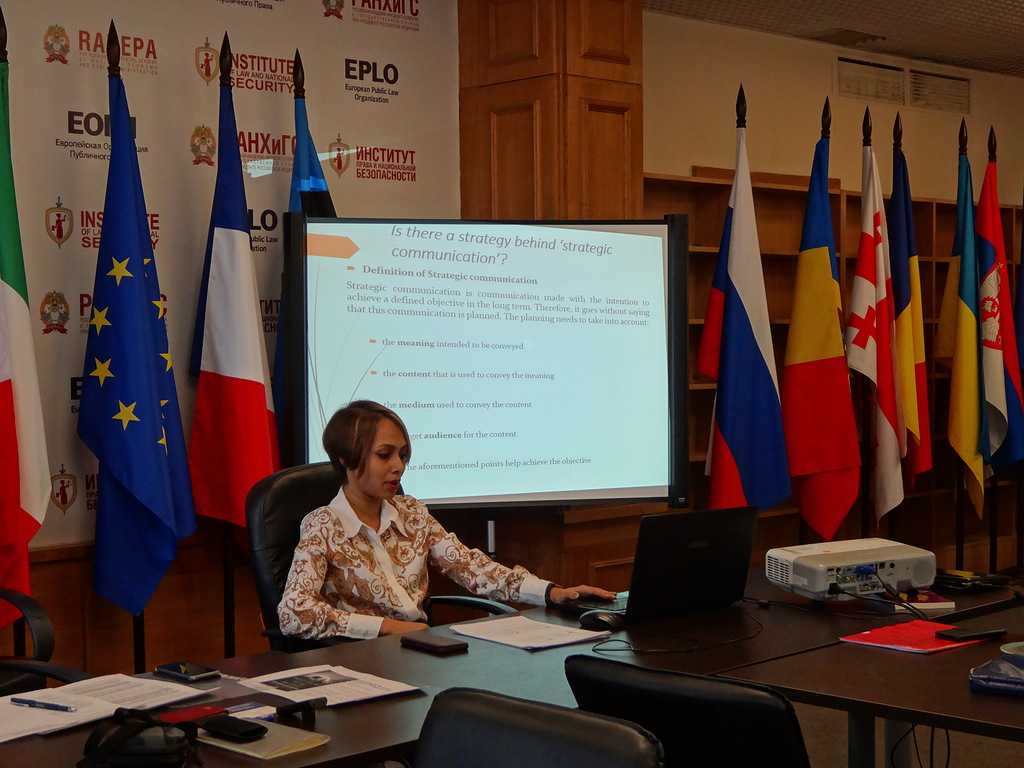
Saswati Dey
Saswati DEY, Master of Arts in Geography and the First Secretary of the Embassy of India in Moscow, considered the topic “Mass Media and Strategic Communication in International Relations” with the special accent on strategy of communication through social media in the world’s largest democracy – India. Ms Dey defined a strategic communication as “communication made with the intention to achieve a defined objective in the long term” and paid special attention on the fact that this communication should be planned. The planning needs to take into account: the meaning intended to be conveyed; the content that is used to convey the meaning; the medium used to convey the content; the target audience for the content; and how the aforementioned points help achieve the objective.
She presented also the case study of the ongoing Indian elections – so-called “WhatsApp elections”, when 40% of the respondents in special survey said they were a members of a WhatsApp group set up by a political party. Almost 40% of Indian respondents said they received more than 10 forwarded messages a day. Wit and humour, sarcasm and localisations have become an integral part of such communications. This situation forces the officials adapt their communications’ content to today’s target audience. In addition, Indian StratCom takes into account the impact of diversity (there are 1.2 billion people, among them 900 million voters (468 million million men and 432 million women), 29 states and 22 scheduled languages in the country). “It is an uphill task for the world’s largest democracy which is fundamentally a pluralistic society to send out a coherent message that everyone could hear in the same way at the same time”, MA Dey concluded.
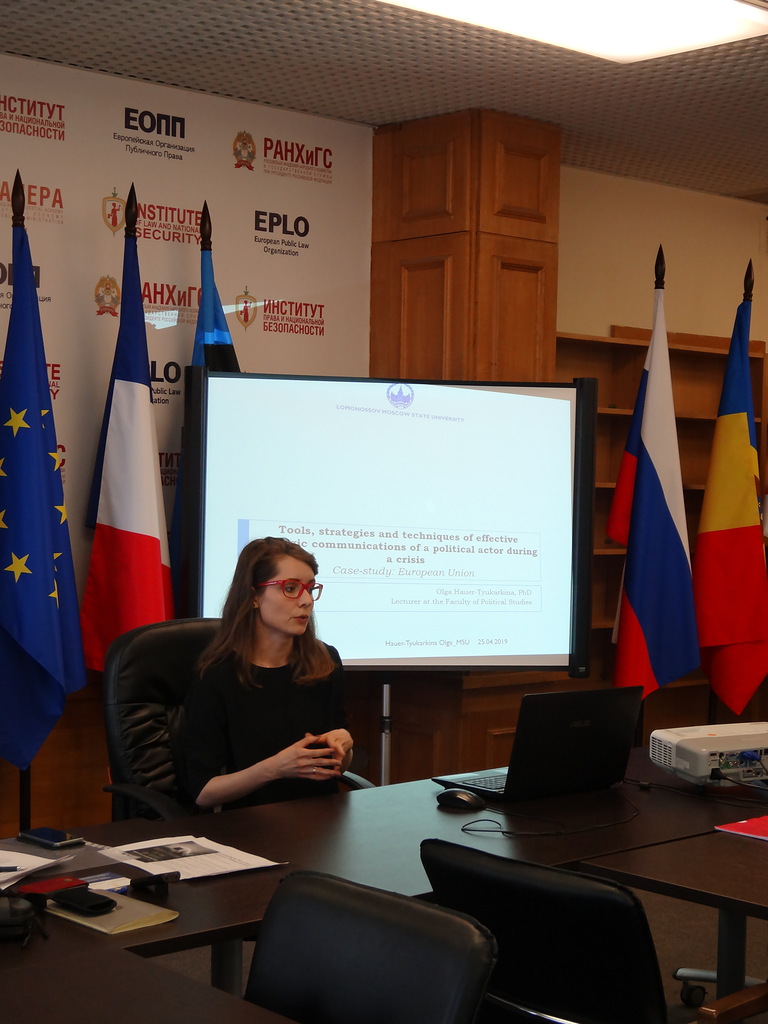
Olga Hauer-Tyukarkina
Olga HAUER-TYUKARKINA PhD, Lecturer at the Faculty of Political Science at Lomonosov Moscow State University, presented her research on “Tools, Strategies and Techniques of Effective Strategic Communications of a Political Actor during a Crisis (Case Study: European Union)”. The key message of her presentation stated that Crisis in not undoubtedly negative phenomenon. It provides the actor with additional “push” for development, change and transition. However, if respective crisis-measures are not taken, actor can suffer big (financial, human, reputational) losses. Dr Hauer-Tyukarkina also considered the difference between the Crisis Management (managing/controlling a crisis situation with the help of different tools based on existing crisis strategy); Crisis Communications (the “dialogue between the organization and the public before, during, and after the negative occurrence, which is based on strategies and tactics created to minimize the threat to the image of the organization”), and Crisis Strategy (strategy on managing a crisis situation which describes key objectives, key communication tools, KPIs trackers etc.). On example of the campaign «I want Europe» (Ich will Europa) implemented in Germany during highest peak of integration and economic crisis, different levels of communication were demonstrated: classic ATL (OOH, digital, print), social media communications, PR, “public Talks”.
Among key learnings Olga Hauer-Tyukarkina presented on the EU materials most important can be following ones. “Although some work has been done, a massive toolbox has been created – there is a lack of consistency in the communications. Comms are there, but not strategic communications. As a result, EU’s image/reputation is vulnerable in times of crisis (negative tone-of-voice in Media, opinion polls etc). Strategic Comms could help overcoming the crisis more smoothly. EU should define its 360-degree strategy with clear mission/vision and narratives, with clearly defined execution plan and synchronized efforts across all bodies, with modern Toolbox.” Although “EU has developed communications infrastructure” (made efficiency review the efficiency, deleted some instruments and focused on national-level communications to broaden outreach) and well-established channels like Euronews and Europa.eu, there can be a long way to the real StratCom.
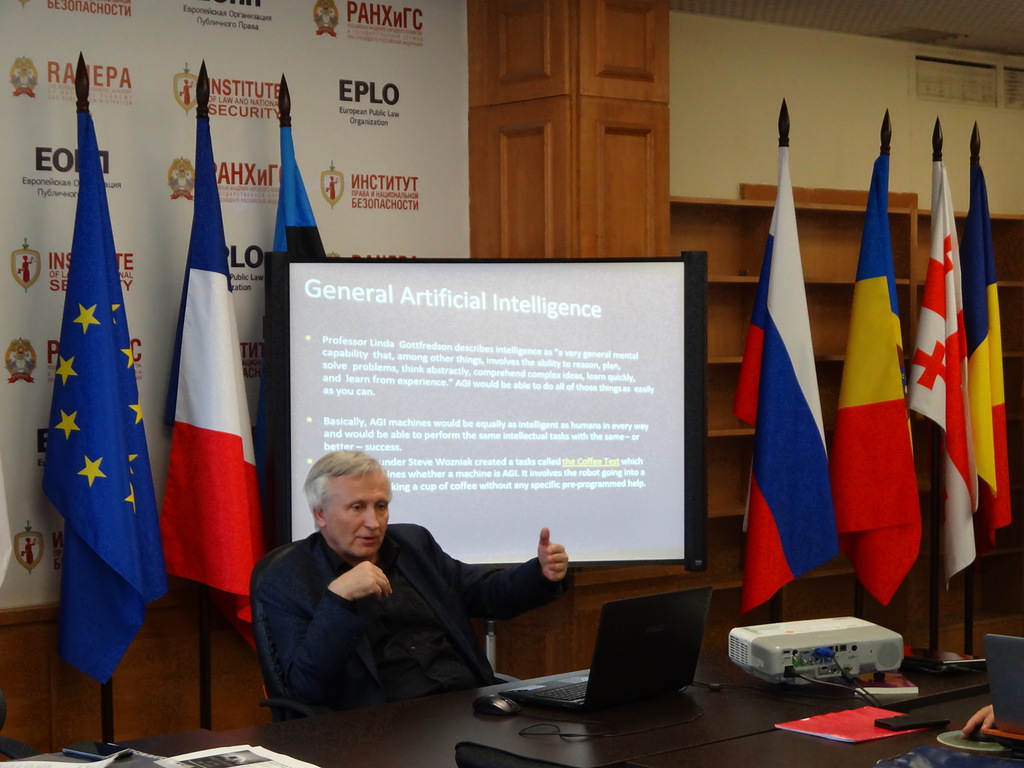
Evgeny Pashentsev
Evgeny PASHENTSEV researched in his paper “Artificial General Intelligence: A New Challenge for Strategic Communication” the new opportunities and risks in the StratCom field caused by the technical progress. In particular, he gave several points of view, on which “humans must become cyborgs” if they are to stay relevant in a future dominated by artificial intelligence. That was the warning from Tesla founder Elon Musk. Musk argued that as artificial intelligence becomes more sophisticated, it would lead to mass unemployment. If humans want to continue to add value to the economy, they must augment their capabilities through a “merger of biological intelligence and machine intelligence”. If we fail to do this, we’ll risk becoming “house cats” to AI”. Especially interesting was Professor Pashentsev’s vision of the possible world order scenarios under the condition of the wide spreading of the new technologies (like AI and genetic engineering). According to his paper, there are some possible variants of the future for humankind in the new reality. First one is (1) current neoliberal or national-conservative models which are in decline practically everywhere. Rapid local conflict escalation all over the globe and especially a potential WW3 will push humankind back to the past. Following consequences can be also possible: (2) modified capitalist systems in the form of global authoritarian or totalitarian regimes necessary for the artificial and controlled stagnation of technical progress and global social order; (3) centralised bureauctatic systems (under the banner of socialism) in which central planning evenly distributes the products produced by the robots; (4) exterminism (a neo-feudal society in which the rich part of society lives in fortified enclaves protected by armies of killer robots); and (5) classless progressive society appearing as a result of the interdependent and to some extent synchronised revolutions (social, AI, genetic etc.).
As Professor Pashentsev concluded, the times are hard, and the strategic task lies not in the search for the alternative configuration of global political and military blocks (or conserving the old ones), but rather in the aligning of joint interests in order to solve the principal issues of mankind. The efficiency of strategic communication as means of collaboration is negligible if strategic interests and goals mismatch drastically. In this case, strategic communication inevitably becomes a tool of information warfare. A program of joint optimisation of strategic communication is completely impossible to implement in the current situation of growing tension between Russia and China on the one hand and the USA, the EU on the other.
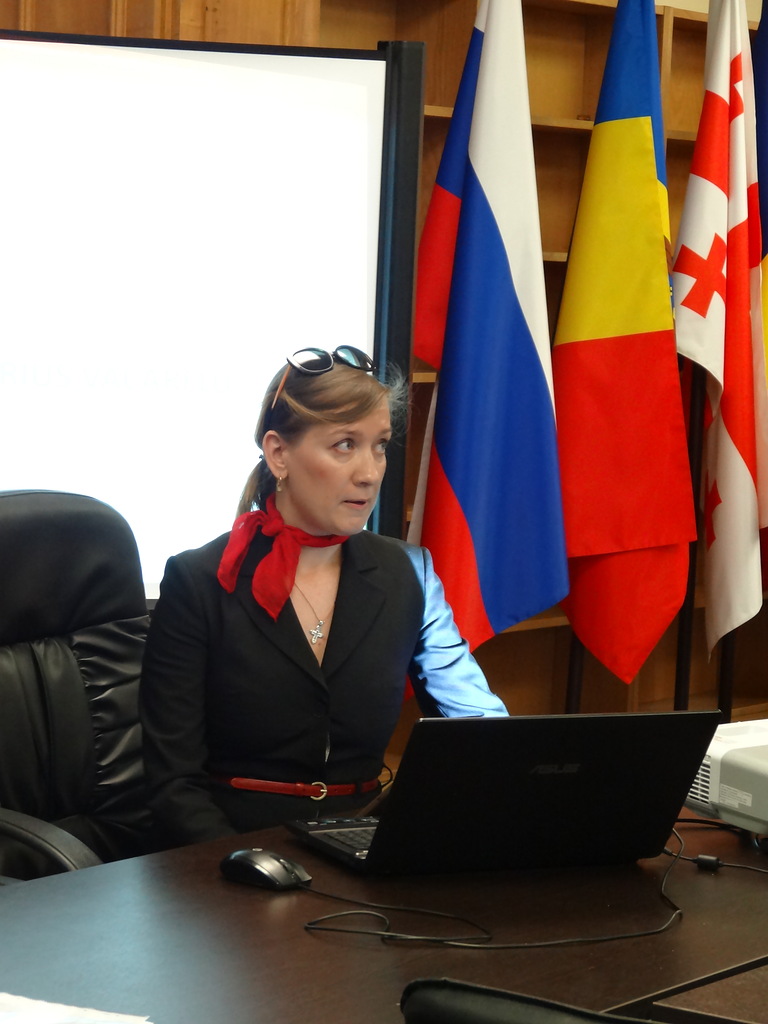
Olga POLUNINA
Olga POLUNINA PhD, Associate Professor at the Russian State Social University, Senior Researcher at the International Centre for Social and Political Studies and Consulting (Russia) revealed in her presentation the topic “Problems of Strategic Communication in Latin America under the Conditions of New Information and Communication Reality”. She stressed the widespread huge stereotypes on Latin America in the minds of “ordinary people” who consider that “Latin America is very far from us”, not only from the geographical but also from the digital point of view. Given these meanings, it is strictly important to learn more about the region and the role of contemporary ICT in its life.
Latin America is a continent of the big contrasts, and the sphere of communication is not an exception. Brazil, Argentina, Chile, Uruguay are the leaders in development and implementation of the new technologies, and many other countries are left far behind. One vivid example came from the journalists who covered the event when Cuban leader Miguel Díaz-Canel took office: all of them mentioned in their reports that he has an iPad, which can be the evidence of certain stereotypes even between media practitioners. However, Latin American market is an area of the big opportunities for the foreign companies (banks, retailers, airlines), and local PR and advertising agencies willingly offer them the services in work with target audiences in the region. Innovation hubs are spreading from Mexico City to Bogota, from Lima to Santiago. For example, Argentina is well-known regional center for digital entrepreneurship; Brazil developed the digital banking system that is on the first place in region. However, still too few companies in Latin America are going digital first. To compete in the digital economy, Latin America should improve its communication skills (networking, teamwork, creativity and innovative agile approach, proficiency in English etc.), Dr Polunina noticed. She also assumed that despite the economic problems (such as unemployment, political and social instability), rapid development of the new technologies (as AI) is the reason for the positive prospect on the region’s future. AI could be, for example, the mean of target management of labor shortenings.
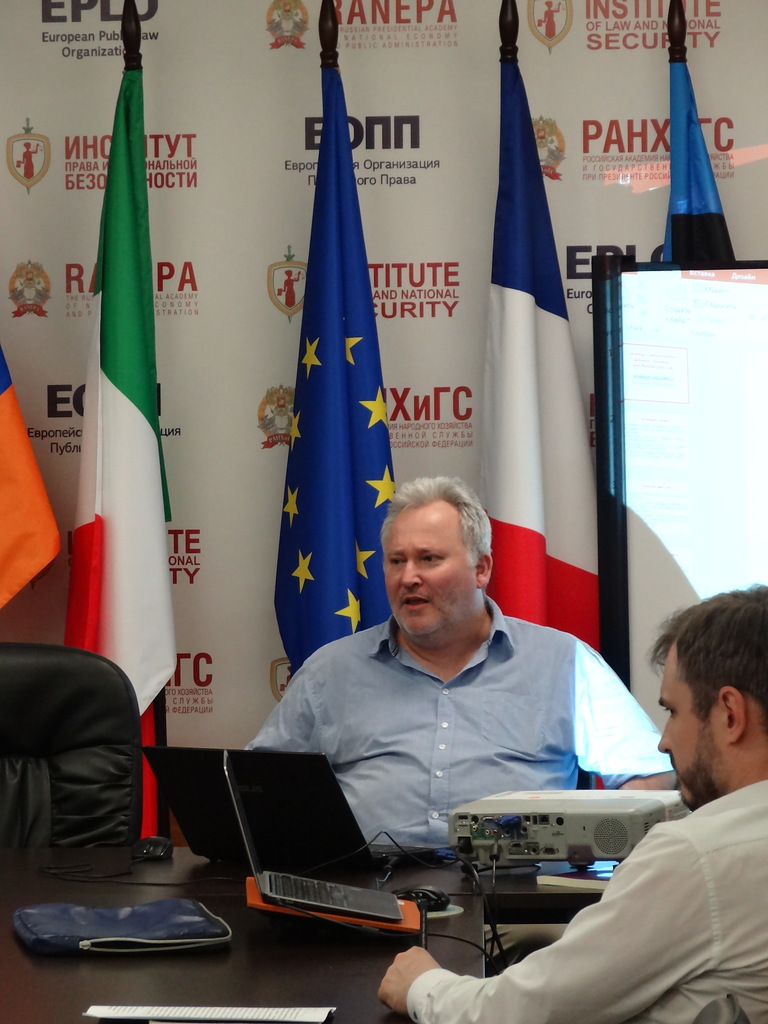
Greg SIMONS
Greg SIMONS PhD, Senior Researcher at the Department of Eurasian Studies at Uppsala University (Sweden) presented the paper “Communicating Key Narratives during Civilisational Decline”. From his point of view, the decline of today’s liberal democratic civilization is evident, “if we look at such values or ideals as the multiculturalism and globalization, which are both the aspects of the liberal global utopia about the people and commerce without borders.” There are good ideas, and on one hand, the liberal democracy is the only legitimate political system. On the other hand, its particular concepts (for example, the notion of democratic peace) justify the export of democracy with the help of armed force. According the theory of democratic peace, the more democracies are in the world, the less armed conflicts are conducted. The non-democracies create the possibility for conflicts that is why they should be converted to democracies. “That is what we see in 2003, when the psychological weapon was used in combination with the counter-terrorist proclamation, and later during Arab Spring…” If the USA and its allies with the links to counter-terrorism didn’t enter Iraq illegally , the Arab Spring would not be possible, Dr Simons noticed. These events refute the theory of democratic peace, as the invasion to Iraq has triggered a number of armed conflicts in the Middle East. Though the contemporary Western elites continue to believe in the liberal democratic ideology, its implementation meets much backlash all over the world. There are the different political institutions, which have been created to support the system of the liberal democracy since the end of the WW II. The system is weakening today because of the number of institutions competing with each other instead of consolidation. On the other hand, such organizations as BRICS and SCO create certain challenge to the Western dominance. The idea of the liberal democracy on the national level also competes with the globalist vision of this phenomenon.
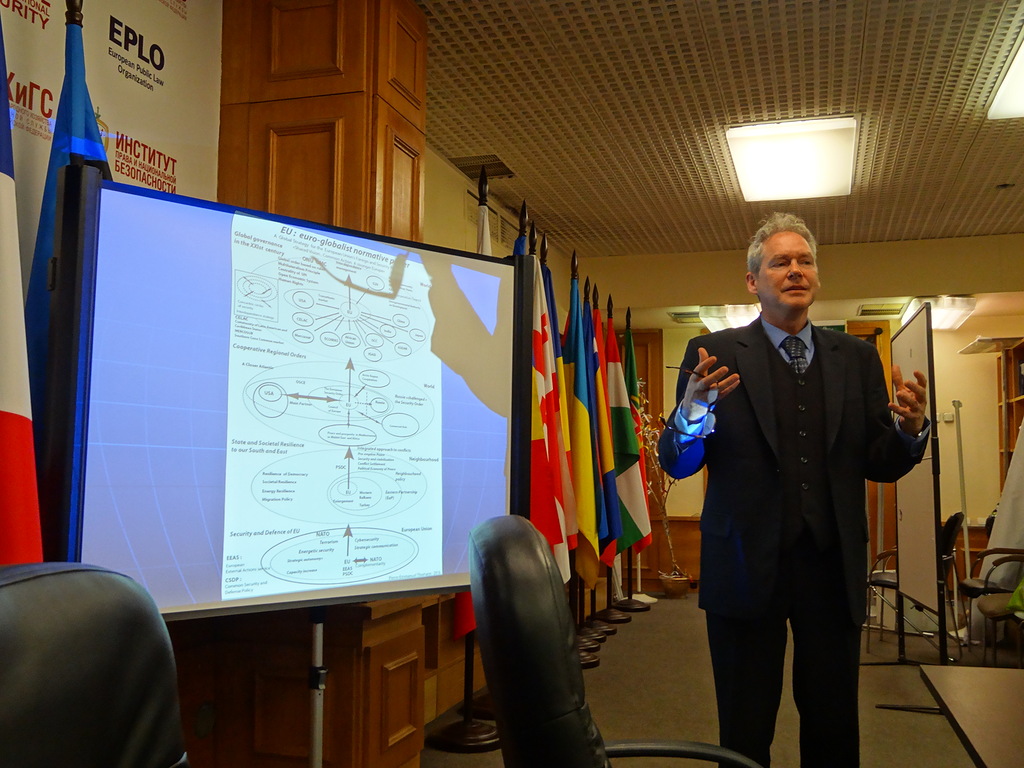
Pierre-Emmanuel Thomann
Pierre-Emmanuel THOMANN PhD, President/Founder of an international association Eurocontinent and an adviser since 2007 at the European Institute of International Relations, (Belgium), explored the topic “Strategic Communication Narratives, Utopian and Realist Geopolitical Visions Related to the European Project in Crisis: the Impact on EU-Russia Relations”. As Dr Thomann noticed, the serious obstacle for development of the non-controversial EU StratCom – its vision of the multilateralism. “Multilateralism is highlighted in each EU strategic document and is mentioned in each speeches of EU representatives at international conferences, as a central element of EU narrative. This notion is very vague and is not really confronted with geopolitical reality. The EU ideological understanding of multilateralism so far constitutes an obstacle to more common representations of the global evolutions.” He considered as an example the last report of the European Parliament on EU-Russia political relations. The EP has underlined, that “whereas Russia’s polycentric vision of the concert of powers contradicts the EU’s belief in multilateralism and a rules-based international order; whereas Russia’s adherence to and support for the multilateral rules-based order would create the conditions for closer relations with the EU”. According to the EU narrative, the “concert of powers” is opposed to “multilateralism” and “ruled-based order”. The condition for better relations between EU and Russia is the acceptance of the EU interpretation of multilateralism.
At the same time, as Dr Thomann stressed, “according to geopolitical reality, poly-centricity is more and more a central feature of international relations. Moreover, it is not obvious to contrast the notion of multilateralism with that of poly-centricity. Poly-centricity implies, as it is highlighted by EU narrative, the use of balance of power as a central doctrine of the concert of powers. It is a model of the past for the EU understanding of international relations. With an alternative narrative, one could on the contrary argue that an acceptable balance of power between states in a multi-centric world, is the pre-condition to achieve multilateral negotiations, This way of combining multi-centricity and multilateralism would not only be more adapted to the geopolitical reality, but would offer more opportunities for mutual understanding between the EU and Russia.” From the point of view of Dr Thomann, EU crisis results in utopian visions instead of realist reform.
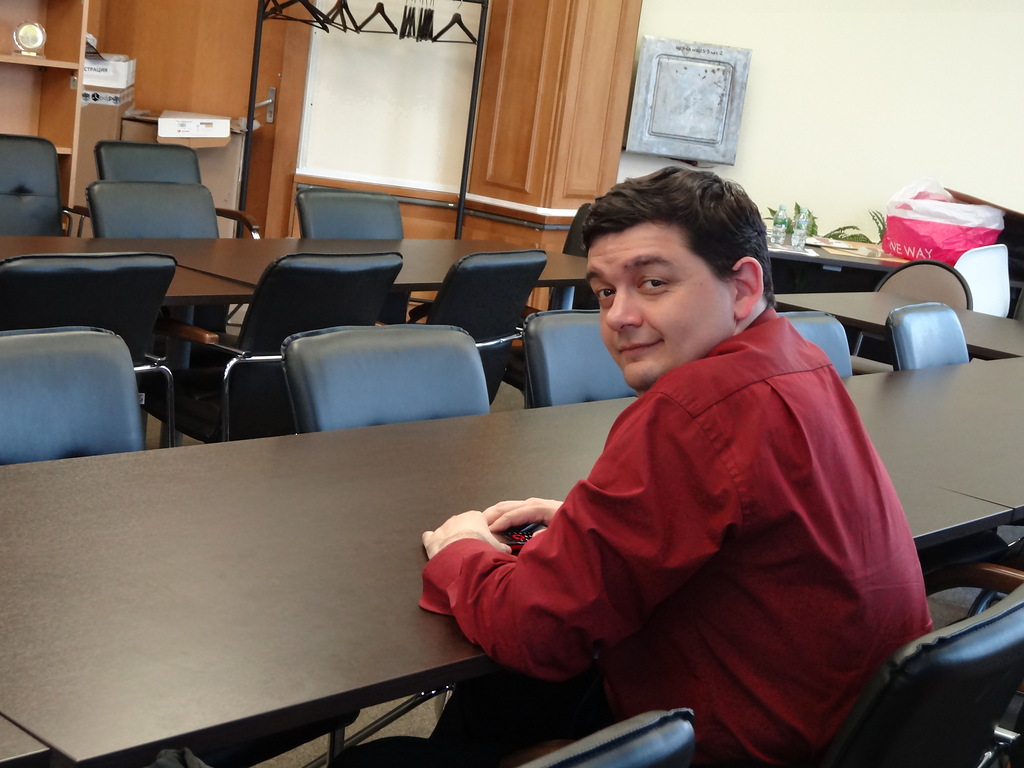
Marius Vacarelu
Marius VACARELU PhD, Expert of National School of Political Science and Public Administration (Romania) highlighted the controversy of the strategic and tactical needs in his paper “Strategic Communication between “Strategic” and Political Daily Life”. Firstly, he stated the important question: what is “strategic” in everyday discourse, is it only a word (which sense is not fully realized by those who use it), a stereotype, or a truly realized necessity? It is also important to find out, who can afford today to think strategic. Today for this we need more information than, for example, 100 or 50 years ago. It requires also the specific skills, level of education and way of acting. “To become a politician today you don’t need even one year of school”, the populist proclamations can open to everyone the access to political career.
Unfortunately, as Dr Vacarelu noticed, there is a certain lack of the strategic thinking among politicians. It requires not only to focus on improving the level of education of politicians, but also to take care of the educational level of citizens. The last should learn to recognize the immediate needs of politicians in support of any decision and the accompanying tactical measures. It is important not to confuse strategic and tactical decisions, measures aimed at achieving public interests or only politicians’ ones. At the same time, we can see that not many citizens have the high-level education (higher than politicians have). Nowadays it is a kind of competition at the global level to attract the investors to every country. Under such conditions, it is necessary to have a strategic vision, in economic policy in particular. In contemporary everyday life, as Dr Vacarelu stressed, that people became more citizens involved in politics. It provides much more rights and a stronger voice, and average people disseminate their opinions faster. Political campaign has to adapt to this reality every day, and this is a core factor which complicates the StratCom, which needs a long-term planning.
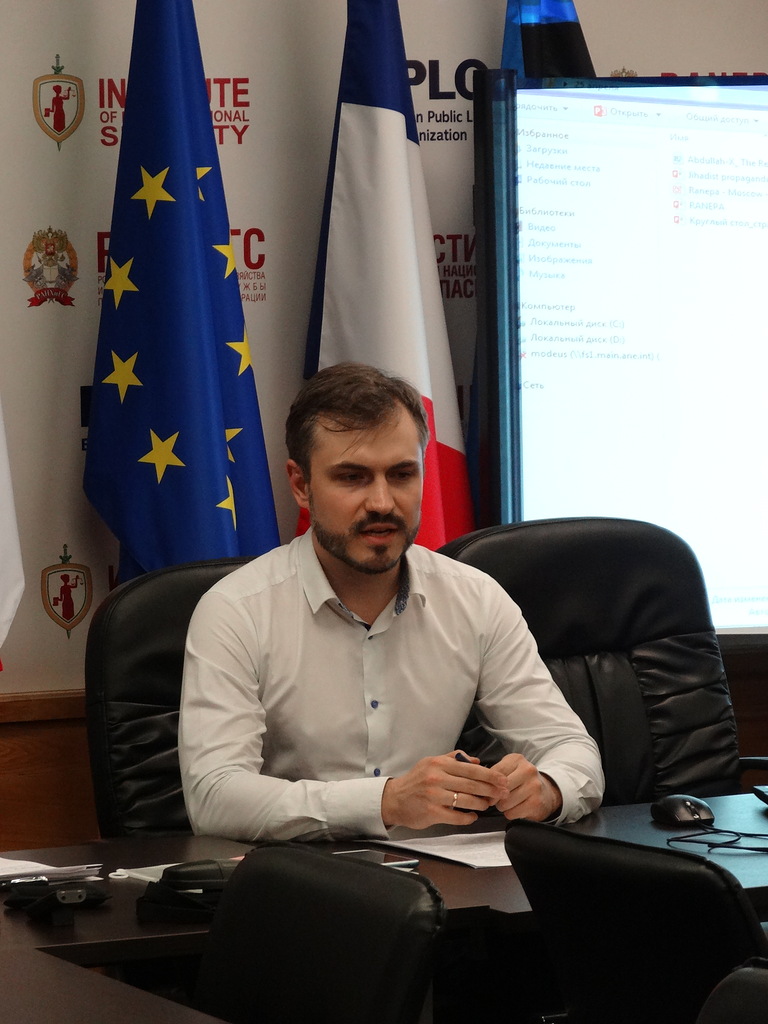
Dmitry Fatykhov
Dmitry FATYKHOV, PhD Candidate at Moscow State Institute of International Relations (MGIMO University) and the analyst at the Executive Office of the President of the Russian Federation, presented a paper “Strategic communications in the EU: current state, prospects, lessons for Russia”.
The rapid development of new information technologies has created countless opportunities but also challenges for the states. Identifying and countering what states perceive as misinformation and hostile propaganda is one of the most important challenges nowadays, and the new information strategies, which will help to reach synergy between nation states, governments, decision-makers, new and traditional media, as well as private sector, are needed. This circumstance led to the wide adoption of the StratCom concept originated from the commercial sphere by a number of countries, mostly in the United States (by Department of Defense). “I believe that in the European Union this concept has been adopted to great effect as well… Recent events such as the Ukrainian and Syrian crises, are the catalysts for the creation of what in the future may become unified system of institutions of information policy making in the EU”, Mr Fatykhov said. According to his opinion, the EU adopted the StratCom concept in a narrow sense, which means countering misinformation about European external politics. This led to the creation of so-called StratCom Task Forces. Despite of the fact that the East StratCom Task Force has only nine employees and just 1-million-euro budget, this structure gives a good example of the unified StratCom unit. The scheme of the EU StratCom institution may become a certain prototype for the centralized Russian strategic communication system.
All the papers raised a number of questions. There was a wide discussion, because of presentations, which showed great interest to the topic of strategic communication in its various aspects.
During the round table, the presentation of the new collective monograph was also held. The book Understanding the War on Terror: Perspectives, Challenges and Issues edited by Riku Flanagan was published this April in “Nova Science Publishers”. Two of the round table contributors, Evgeny Pashentsev and Darya Bazarkina, took part in this publication.
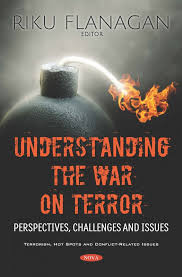
Anna Velikaya and Greg Simons informed about a book edited by them and soon to be published by Palgrave Macmillan Russia‘s Public Diplomacy. Evolution and Practice. Russian public diplomacy attracts growing attention in the current global climate of tension and competition. However, it is often not understood or is misunderstood. Although some articles and book chapters exist, there are almost no books on Russian public diplomacy neither in Russian, nor in English. This edited collection is an in-depth and broad analysis of Russian public diplomacy in its conceptual understanding and its pragmatic aims and practice. Various aspects of Russian public diplomacy – from cultural to business practices – will interest professors, students and practitioners from various countries.
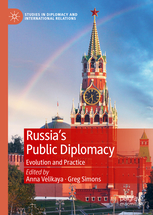
In 2019-2020 with active participation of the members of GlobalStratCom strategic studies associations three more volumes prepared by international teams from 19 countries will be published: Strategic Communication in EU-Russia Relations: Tensions, Challenges and Opportunities (ed. by Evgeny PASHENTSEV), Terrorism and Advanced Technologies in Psychological Warfare: New Risks, New Opportunities to Counter the Terrorist Threat (ed. by Darya BAZARKINA, Evgeny PASHENTSEV and Greg SIMONS), Artificial Intelligence and International Psychological Security (ed. by Evgeny PASHENTSEV).
Darya Bazarkina DSc,
Professor at the Chair of the International Security and Foreign Policy of Russia, RANEPA
Kaleria Kramar,
Research Interne of the International Centre
for Social and Political Studies and Consulting
See more photos: https://yadi.sk/d/MpRCm0h1Q9yPRw